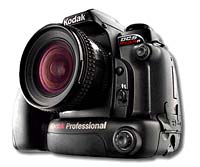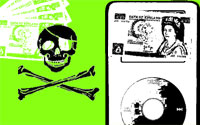 Now holding the record for the fastest-selling debut album in the UK, the success of young British indie-rockers Arctic Monkeys shows how the Web has changed both the way in which bands promote and market themselves and how people find new music.
Now holding the record for the fastest-selling debut album in the UK, the success of young British indie-rockers Arctic Monkeys shows how the Web has changed both the way in which bands promote and market themselves and how people find new music.
Before the Web, keeping in touch with fans (and prospective record buyers) was a tough business for unsigned acts.
For most bands, their only point of contact with their audience was at a gig and once their knackered Transit van had spluttered out of town, there was little prospect of keeping fans notified, short of setting up expensive snail-mail mailing lists or local poster campaigns.
But the Internet has changed all that.
When a band leaves the stage these days you’re more likely to hear them clearly shout out their Web address than a mumbled “thankyougoodnight” and any leaflets will be festooned with .com addresses.
 For less than the cost of a handful of flyers, bands can set up their own Websites, offer free downloadable tunes, sell merchandise, maintain free email mailing lists and invite a dialogue with their fans.
For less than the cost of a handful of flyers, bands can set up their own Websites, offer free downloadable tunes, sell merchandise, maintain free email mailing lists and invite a dialogue with their fans.
The Arctic Monkeys built up their formidable fan base after handing out free CDs of their tunes at early gigs in 2004.
Excited fans uploaded the songs onto file sharing networks to share with others as the buzz around the band built up a head of steam.
Suddenly venues were packing out and the band were astonished to hear punters singing along to songs before they’d released a single record.
 With a growing fanbase clambering for more, it wasn’t long before record companies were begging to sign up the band, and last week’s album release on Domino Records saw the Artic Monkeys record-breaking leap up the charts.
With a growing fanbase clambering for more, it wasn’t long before record companies were begging to sign up the band, and last week’s album release on Domino Records saw the Artic Monkeys record-breaking leap up the charts.
Of course, it wasn’t just the Web that made the band a huge success, it was the chuffing great tunes, but it does illustrate how the Internet is changing the way some consumers discover new music, and how bands are able to exploit these new possibilities.
It’s just a shame that the MP3 age arrived after the ‘zenarchist’ KLF had left the music business.
Now that could have been real fun!
 ?The tumbrels are resounding for enemies of Google European head, and former T-Mobile boss, Nikesh Arora, following the “disappointing” financial results. In fact, the results were trivially down, but that was enough, and his head will be anxiously sought by Google in the US, say our stray packet interception team.
?The tumbrels are resounding for enemies of Google European head, and former T-Mobile boss, Nikesh Arora, following the “disappointing” financial results. In fact, the results were trivially down, but that was enough, and his head will be anxiously sought by Google in the US, say our stray packet interception team. And the City doesn’t like people it can’t cut down to size. Give them an excuse, and they will jump on you, which is what happened. That $40m is the excuse they’ve been waiting for. “Misled us with the forecast!”
And the City doesn’t like people it can’t cut down to size. Give them an excuse, and they will jump on you, which is what happened. That $40m is the excuse they’ve been waiting for. “Misled us with the forecast!” DAB radio (Digital Audio Broadcasting) is really taking off in the UK.
DAB radio (Digital Audio Broadcasting) is really taking off in the UK. The continued growth of DAB is hoped to receive a further boost as uber-regulator, OfCom, plans to release further, new DAB-able spectrum.
The continued growth of DAB is hoped to receive a further boost as uber-regulator, OfCom, plans to release further, new DAB-able spectrum. Inga Chernyak, until recently, had a legal clerk job at an IP law firm in New York City. On the 26 January she was called in to the firms HR department and fired.
Inga Chernyak, until recently, had a legal clerk job at an IP law firm in New York City. On the 26 January she was called in to the firms HR department and fired. There may be those who think that it’s pretty obvious that is you work in an IP firm; wanting to train as an IP lawyer; you hold views that IP law is over restrictive; then have your name and photo featured in an article that starts by describing how to circumvent CD DRM protection and are a founder of NYU chapter of the Free Culture movement – you’re going to end up in trouble said IP law firm.
There may be those who think that it’s pretty obvious that is you work in an IP firm; wanting to train as an IP lawyer; you hold views that IP law is over restrictive; then have your name and photo featured in an article that starts by describing how to circumvent CD DRM protection and are a founder of NYU chapter of the Free Culture movement – you’re going to end up in trouble said IP law firm.  BBC World have been busy bunnies of late, signing distribution deals all over the globe.
BBC World have been busy bunnies of late, signing distribution deals all over the globe. The video streams include the adverts that would be shown if BBC World were being shown on the TV in the region. As yet, BBC World aren’t charging their advertisers any extra to splash them on mobile screens – they’re seeing it as added value for them
The video streams include the adverts that would be shown if BBC World were being shown on the TV in the region. As yet, BBC World aren’t charging their advertisers any extra to splash them on mobile screens – they’re seeing it as added value for them In the 3/Hutchinson Australia deal, the subscribers are being asked to pay Au$4/month for unlimited access, Au$2/day or Au$0.50/two minutes.
In the 3/Hutchinson Australia deal, the subscribers are being asked to pay Au$4/month for unlimited access, Au$2/day or Au$0.50/two minutes. For the first time in its long history, Eastman Kodak is generating more annual sales from digital imaging than from film-based photography.
For the first time in its long history, Eastman Kodak is generating more annual sales from digital imaging than from film-based photography. But it’s not all good news though, with the company reporting that total losses could top an eye watering $1 billion, as a result of the hugely expensive restructuring demands required by a potentially risky shift to digital.
But it’s not all good news though, with the company reporting that total losses could top an eye watering $1 billion, as a result of the hugely expensive restructuring demands required by a potentially risky shift to digital. The company is still half way through the arduous task of restructuring the business for the digital world, and has already laid off some 25,000 workers.
The company is still half way through the arduous task of restructuring the business for the digital world, and has already laid off some 25,000 workers. Fortunately for Kodak, Christmas proved a highly profitable period with sales of its EasyShare Printer Docks surging 95%, and sales of kiosks to drugstores and other outlets up 23%.
Fortunately for Kodak, Christmas proved a highly profitable period with sales of its EasyShare Printer Docks surging 95%, and sales of kiosks to drugstores and other outlets up 23%. News has broken that two men in the UK have been found liable for file sharing their music. The first ruling of its kind in the UK.
News has broken that two men in the UK have been found liable for file sharing their music. The first ruling of its kind in the UK. Having been found liable, the two are now exposed to the BPI’s legal fees. Given the City law firms the BPI use, where it’s not unusual to pay £200/hours for their services, it’s going to be an expensive business. BPI have stated that “Total costs are estimated at £13,500 and damages are expected to take the bill even higher.”
Having been found liable, the two are now exposed to the BPI’s legal fees. Given the City law firms the BPI use, where it’s not unusual to pay £200/hours for their services, it’s going to be an expensive business. BPI have stated that “Total costs are estimated at £13,500 and damages are expected to take the bill even higher.” A great shame to hear that ZipTV has had to enter receivership.
A great shame to hear that ZipTV has had to enter receivership. They way it worked was, as the punters were watching ‘normal’ TV and an advert from one of ZipTV’s clients was shown, a press of the Red button on the remote control (the UK standard for interaction), would take the punter away from the ‘normal’ TV show, to a dedicated TV channel. This gave the advertiser the opportunity to show an 8 minute video advert, but just pay for a 30-second spot-ad to get them there.
They way it worked was, as the punters were watching ‘normal’ TV and an advert from one of ZipTV’s clients was shown, a press of the Red button on the remote control (the UK standard for interaction), would take the punter away from the ‘normal’ TV show, to a dedicated TV channel. This gave the advertiser the opportunity to show an 8 minute video advert, but just pay for a 30-second spot-ad to get them there. You see Sky, and it’s very competent employees and owner, Rupert Murdoch don’t muck around. If they see some bright young things coming along with a super wheeze they will drain their income – it will get their attention – and not in a good, cuddly way.
You see Sky, and it’s very competent employees and owner, Rupert Murdoch don’t muck around. If they see some bright young things coming along with a super wheeze they will drain their income – it will get their attention – and not in a good, cuddly way. Mobile operator 3 has launched an innovative service that, for the first time, pays customers to receive calls and texts.
Mobile operator 3 has launched an innovative service that, for the first time, pays customers to receive calls and texts. Designed to boost usage of data services, 3 also hopes that the cash-back scheme will prove attractive to new punters and tempt customers from other networks to switch.
Designed to boost usage of data services, 3 also hopes that the cash-back scheme will prove attractive to new punters and tempt customers from other networks to switch. The WePay top-ups come as all-cash vouchers available in £10, £15 and £20 denominations, with no expiry date. However, the WePay cash credits are only valid for 30 days.
The WePay top-ups come as all-cash vouchers available in £10, £15 and £20 denominations, with no expiry date. However, the WePay cash credits are only valid for 30 days. Over the last couple of weeks there’s been a lot of speculation that Disney are going to be bidding to buy Pixar, the digital animation studio that’s supplied the majority of Disney’s successful computer-generated animation successes.
Over the last couple of weeks there’s been a lot of speculation that Disney are going to be bidding to buy Pixar, the digital animation studio that’s supplied the majority of Disney’s successful computer-generated animation successes.